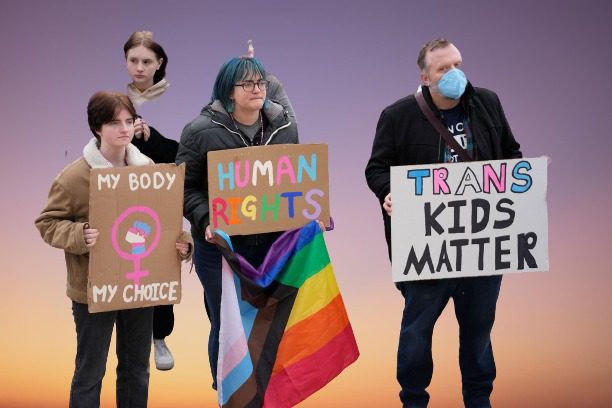Transgender Care Bans: In recent times, numerous states have implemented bans on transition-related care for transgender minors, leaving families and medical providers grappling with difficult questions and uncertain futures. The impact of these bans extends beyond just medical care, as families with transgender children also express concerns about new laws restricting access to restrooms and sports teams. The consequences of these policies are far-reaching, affecting the lives of families and the medical professionals who provide essential care.
The Plight of Transgender Families
With the banning of transition-related care in many states, families are faced with tough decisions. Some are choosing to uproot their lives and move to states where such treatments are still allowed. The idea of leaving their homes, jobs, and communities is daunting, but the necessity of accessing appropriate medical care for their transgender children outweighs these considerations.
Traveling for Medical Care
Others are opting to stay put for the time being but are forced to travel out of state to ensure their children receive the necessary care. This puts additional financial and logistical burdens on families, adding to their already stressful situations.
The Uncertainty Beyond Medical Care
It’s not just medical care that families are worried about. The implementation of laws restricting restroom access and participation in sports teams creates additional hurdles for transgender children. Families fear that these laws further stigmatize and isolate their children, denying them the basic rights and opportunities afforded to their cisgender peers.
Struggles Faced by Doctors
For doctors in states where transition care for minors remains legal, the bans have resulted in a surge of new patients seeking their services. Medical professionals are struggling to cope with the sudden influx of patients from other states, leading to significant wait times for initial appointments.
Clinics Shutting Down
Some doctors report wait lists exceeding a year, leaving transgender youth and their families in limbo as they wait for crucial medical care. The strain on medical providers and the healthcare system as a whole is palpable.
The Scope of Transgender Care Bans
The scope of these bans is significant, with laws in 20 states leaving clinics uncertain about their future and families searching for medical care across state lines.
Number of Affected Youths
According to data from the Williams Institute at the UCLA School of Law, over 93,000 transgender youths live in states that have passed bans. While not all of them require or receive puberty blockers or hormone therapy, the number of teenagers identifying as transgender has been rapidly increasing in recent years.
Also Read: Missing Michigan Toddler Found Dead
The Impact on Families
Families, facing these challenges head-on, are making difficult choices. Some have already begun relocating to states where transition-related care is still permitted, seeking environments that are supportive and understanding of their children’s needs.
Awaiting Court Challenges
Others are awaiting the outcomes of court challenges in states like Florida, Kentucky, and Nebraska, hoping for legal victories that will allow them to stay in their current locations without sacrificing their children’s well-being.
Wrestling with Difficult Choices
However, many families find themselves wrestling with the decision of whether to stay or leave, carefully weighing the impact on their careers, finances, and support networks.
The Debate on Gender Transition Care
Internationally, several European countries with nationalized healthcare systems have reviewed the evidence and implemented limitations on gender-related medications for children. They prioritize patient safety and emphasize the need for precision in decision-making.
State-Level Legislation
In the United States, the debate has largely taken place in statehouses, with Republican-led legislatures passing bills thatrestrict access to gender transition care for minors. Advocates argue that these treatments may be irreversible and that children lack the maturity to give informed consent, often going as far as calling the treatments mutilation.
Medical Associations’ Stance
However, major medical associations in the United States, including the American Academy of Pediatrics, support gender transition care for minors. They emphasize that this form of healthcare can be beneficial for many patients and argue that legislative bans are a dangerous intrusion into complex decisions best left to doctors, patients, and their families.
Challenges Faced by Medical Professionals
The flurry of legislation has reshaped the field of gender transition care for minors. Some doctors express concerns that young physicians may be dissuaded from specializing in this area of medicine in much of the country.
Difficult Choices for Doctors
Physicians face the dilemma of providing illegal care or being perceived as negligent. Some doctors have made the difficult decision to relocate to states where treatment is allowed to continue their work without legal barriers.
Overwhelmed and Under Distress
Healthcare professionals in states where treatment is still permitted are overwhelmed and under distress. Limited capacity for research and increased stress levels add to the challenges they face in providing gender-affirming care.
Conclusion of Transgender Care Bans
Transgender care bans have significant implications for families and medical professionals. Families are forced to make difficult decisions, either relocating to states with accessible care or navigating legal challenges while remaining in their current locations. Doctors grapple with the reshaping of the treatment landscape and the ethical dilemmas associated with these bans. As the debate continues, it is crucial to prioritize patient well-being, support ongoing research, and foster understanding and inclusivity for transgender youth and their families.

